Freeing Spirits
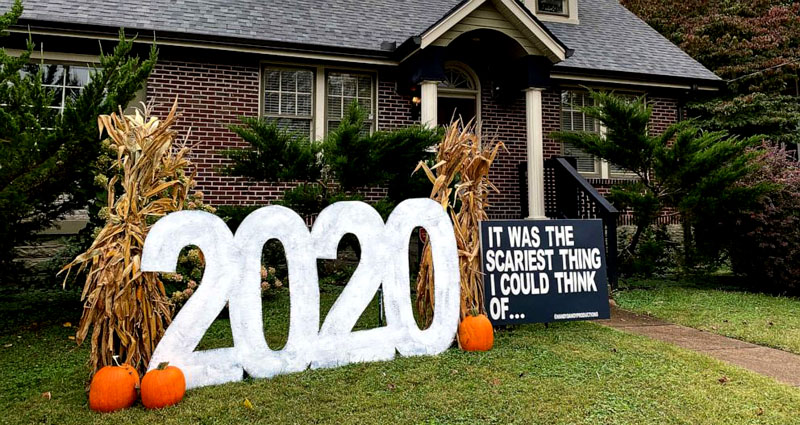
“‘Our brains really are very eager to get back to normal, to get back to January 2020.’ But that’s simply not possible.”
– Dr. Gleb Tsipursky,
CEO of Disaster Avoidance Experts, USA Today
Key: Coping with grief and loss is a large and potentially overlooked part of the COVID-19 culture which will become more pronounced as the holiday season progresses.
Living It: Let go of what you can, make changes where you can and move forward in the hope that some losses will be restored while others will give way to new traditions.
Clinical Concepts: Applied grief, loss and acceptance theories in an adaptive, positive psychology framework.
I love Halloween, let’s start there. I have loved it all my life. In years past on Halloween I’ve extolled the many virtues of horror movies and television, wrote a two-part expose on clown fear (with interviews!) and even examined fear itself. This year, we dig to the roots of the holiday, for wisdom on how to move forward in our enjoyable COVID-19 lifestyles.
This Halloween will be different than any before it. It must be. With COVID-19 many things have passed away or changed. According to Dr. Anthony Fauci, as quoted by USA Todayearlier this month, “‘getting back to a degree of normality which resembles where we were prior to COVID’ might not arrive until late 2021,” (Shannon, 2020).
That fact cuts me to the quick as I think of the throngs of Trick-or-Treaters that we usually have running up and down our suburban lane, campfires cheerily lighting front yards, sounds of laughter and spooky soundtracks, fire trucks and police cars throwing candy from windows.
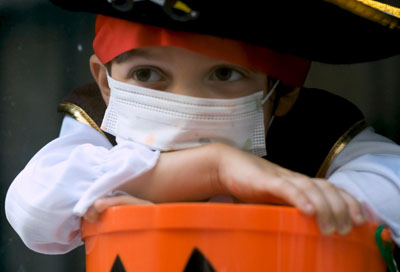
Not this Halloween.
As that has sunk in this month, I looked back over the history of Halloween, which was not about candy or Trick-or-Treating. According to the esteemed Encyclopedia Britanica, our Halloween is a blend of Samhain from the ancient Celts, the Roman harvest festivals of Feralia which commemorate the passing of the dead and a touch of All Saints’ Day after it was moved to the first of November.
For the sake of our betterment, we’re going to stay old school and focus on Samhain when “the souls of those who had died were believed to return to visit their homes, and those who had died during the year were believed to journey to the otherworld,” (Britanica, 2020). Bonfires were lit to light the way of those who had passed and disguises were worn to hide from, frighten or celebrate with those who had returned, all with the air of a party. Death is part of life and the fallen harvest means a bounty for winter so good cheer was not unwelcome amid the loss.
At the center of Samhain was one crucial dynamic: Letting go to that which has passed away so they, and we, can move on. What better time to let go of some of our COVID-19 losses than Halloween? What better way to honor the festival which has changed so much over the centuries than to return to its roots amid our current changing culture?
I must note, that I do not seek to trivialize the actual deaths, loss of jobs and heartbreak that we have faced. Grieving for those things comes in their own times and must be honored as such. But perhaps, as Halloween has always been viewed as a time when the veil grows thin, tomorrow night could be a way to walk another step closer to that healing, to release a little more. We have all lost something to this virus and have been hurt as a result. Letting go is a process which is incredibly challenging even though holding on may mean holding onto a pain that has become toxic to us. “Holding on is involuntary, not a conscious decision,” wrote Dr. Grant H. Brenner, “maybe at some point in the past it was purposeful, necessary, but no longer.” This is especially true when the coronavirus pandemic has “left countless people longing for a pre-pandemic way of life,” but “that desire is likely only further straining our mental health” (Brenner, 2020; Shannon, 2020).
This Halloween will be different for all of us. Some have losses grievously large, yet all have suffered small ones. There is a way forward and it starts by letting go.
Honoring the Passing in Hope
“Letting go is the gold ring of positive change, releasing us from the chains of the past…relaxing into and passing through suffering into peace and possibility. It seems ever-elusive, until it’s not.”
– Grant Hilary Brenner MD, FAPA
Prominent Psychiatrist, Author and Teacher
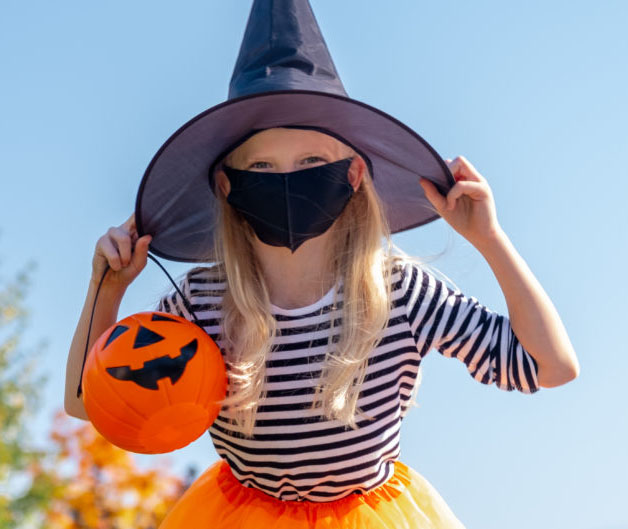
Halloween has always walked hand-in-hand with fear due to the connection with death and the unknown. Fear often walks hand-in-hand with grief and loss because every loss reminds us of the impermanent beauty of while forcing the self-evaluation of “who am I now that X is gone?” USA Today noted that “months ago, experts recommended embracing grief amid the pandemic,” citing several potential losses. But how many of us have grieved—myself included? How many of us are stuck waiting, still seven months later, for this to blow over?
“Letting go is threatening because—even if we’ve lived with the growing awareness that whatever we are holding on to is…outgrown—it feels as if letting go means reliving the original injury,” Dr. Benner said. “When we are ready, letting go is cathartic, often sad but beautiful, and painful. Until then, time is partly frozen.”
In terms of grief, I have felt myself move from shock to anger, experienced deep sadness, but I’m not sure how close I am to acceptance. How close are any of us, really? I am going to take one step closer to letting go this Halloween. If you would like to as well, here’s some ways to do so while honoring the holiday.
Perhaps we are ready, or willing to move on. Then the letting go may be a simple, yet still challenging and courageous act of embracing and adapting to the present moment. A willful letting go of “I wish it was still…” to enjoy the now, even with complications. Actively searching for joy has been shown to change our thought patterns and make us more likely to find it.
But for many of us, there is a block, an impasse that makes it near impossible to let go. In that case, we may need something more formal, like this:
First we identify the losses physically, in writing on a disposable item. I have had clients write a loss on a leaf, a balloon, a piece of rice paper. The means is personal, the writing is key. Your losses are real and deserve recognition. Getting them out of our hearts and into the world in some fashion that can be let go of is key. This should be a quiet time to honor and reflect on all that they have meant to us. This is not a time for self-recrimination or minimizing. It does not matter if anyone else would see the loss as big or important; it’s your part of pre-COVID life, and it’s not here right now. Honoring the pain of that also honors the power it had.
Once you have your losses gathered, regard each one, and try and think of how you have adapted to the loss with a creative COVID work-around or how you could do so now. This process could be done on paper as well, but a paper you will save because it answers the question “who am I now” while also showing us how strong and creative we are.
Finally, we let go. That method is again personal. Perhaps it involves burning the losses in a Halloween campfire or candle and watching the embers rise. Maybe it’s crumbling the leaf and blowing the bits off your hand in a goodbye kiss. Rice paper is great for floating away downstream or dissolving it in a basin. The important part is that, as you release the item, you release yourself.
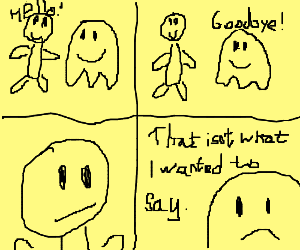
If you are not ready for this level of letting go, that’s fine. Halloween can be used as a time to step away from the pain for a night in costume. As we dress, we try to fully embody the character or role which we are dressing up as. This pirate, Powerpuff Girl, superhero, video game character or athlete has not lost what we have. We promise that we will pick up our losses tomorrow, but for tonight we will not be looking back at what we lost but we will be following safe COVID practices moving forward as free as the character we are made up to be.
Moving forward is the point of letting go and looking forward is also the other part of Samhain—looking toward the return of things that had passed away. Let us always remember, as we celebrate in a new way this Halloween that there will again be throngs of Trick or Treaters ringing bells, there will again be Halloween parties. Some things passed will return, and those that have not will be replaced with new traditions, just as Samhain was replaced with Halloween. Not forgetting the past but honoring it and moving forward.
This Halloween will be different. This Halloween has the potential to be one where we can show our strength and creativity, share our grief, focus on our priorities and begin to heal. There has never been a Halloween like that before.
And that might be something to celebrate after all.
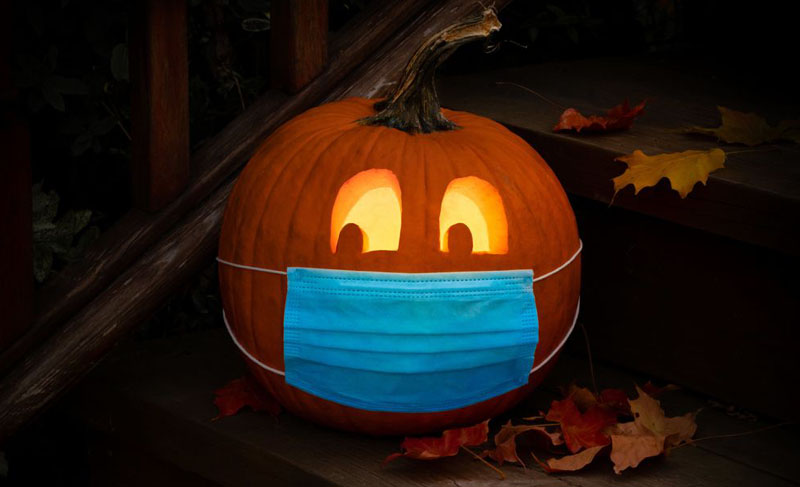
(2020) Halloween Encyclopedia Britanica Retrieved from: https://www.britannica.com/topic/Halloween
Brenner, G. H. (2020)5 Keys to Letting Go. Psychology Today. Retrieved from: https://www.psychologytoday.com/us/blog/experimentations/202007/5-keys-letting-go
Shannon, J. (October 2020) When will things go back to normal? Experts say that’s the wrong question amid COVID-19. USA Today. Retrieved from: https://www.usatoday.com/story/news/health/2020/10/10/coronavirus-when-return-to-normal-life/5882898002/

 Previous Post
Previous Post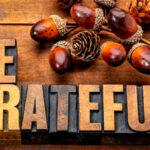 Next Post
Next Post